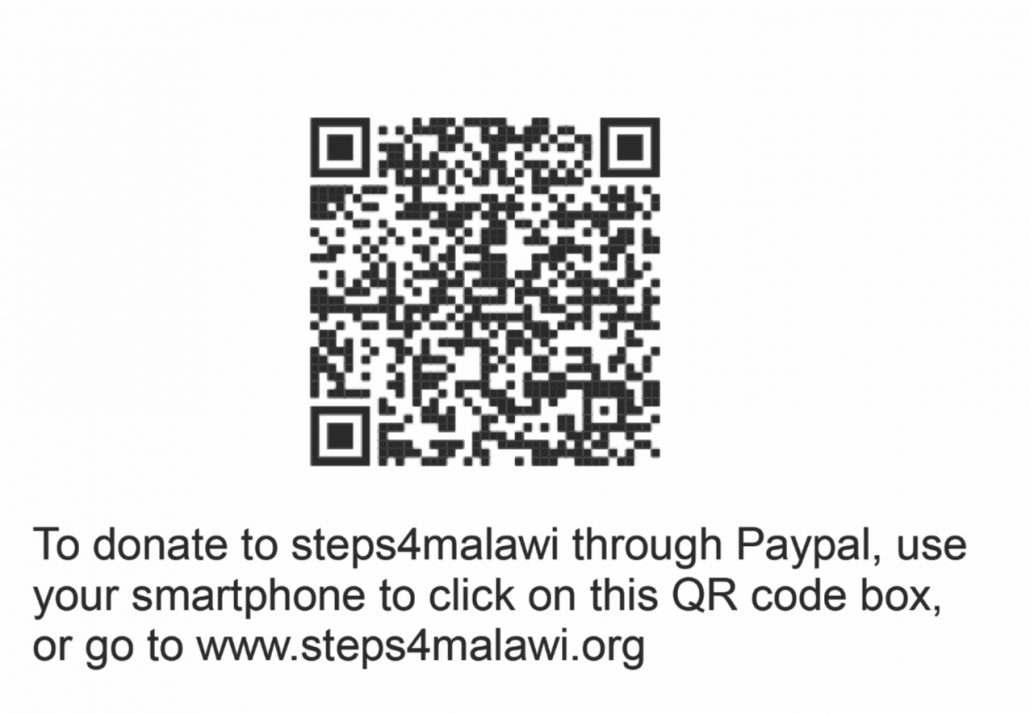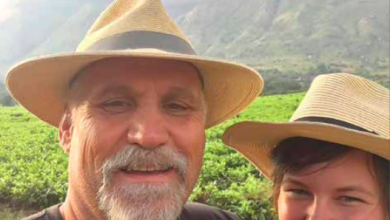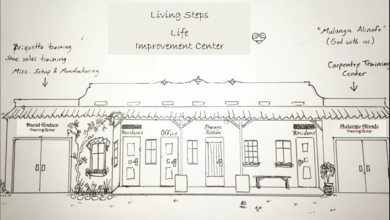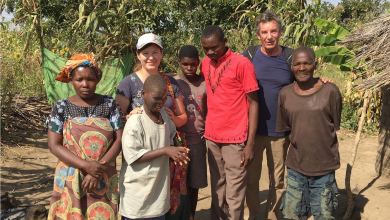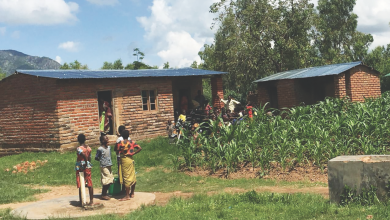Dan Shulters Steps4Malawi – 2019 Wrap Up
As a child, I used to try to imagine people on the other side of the world. Knowing someone who’s on the other side of the world makes it even a more powerful practice. That said, at this very moment, as you read these words, Dan and Alise Shulters, previous long-term residents from Ashland, are probably fast asleep in remote Malawi. There’s no air conditioning and the windows are open to let any hint of a breeze flow through. Mosquitoes will eat you alive in a country where there is malaria, so they are sleeping under netting. It’s hot and humid, in a way many North Americans have never experienced.
The car’s got the wheels off – broken down again. But it doesn’t matter. Tomorrow Dan’s making the 3-mile walk to town to get it fixed. What a pain. Oh wait, that’s right, they don’t own their own car. Their community is glad they are back. Within one day people have walked miles to greet them because someone told them they saw Dan and Alise drive by. Life continues to be hard since the cyclone from the previous rainy season washed away the fields and thousands of houses. Here you’ll hear the seasonal treat recommendation, “Do you want an eggnog latte?” at your local coffee spot, at the same price as life-saving medical treatment in the villages. You’re back in Ashland where it’s getting cooler and winter will soon arrive, while on the other side of the equator things are getting hotter. You remember that you still have plenty of time to do your shopping on Amazon later this evening and get a delivery by Thursday. Market days come a couple of times a week in the trading centers scattered in the villages to get what you need after a couple of miles walk while making a mental note that there’s no refrigeration to make it last.
In today’s interview, I catch up with Dan to get the lowdown on life in Malawi.
Dan, how’s it going?
Good. It’s a lower humidity today, so the 94-degree heat only feels like 96 today. We’re supposed to be expecting a thunderstorm sometime this afternoon so the breeze has actually stirred a little bit.
Ok, so give us the lowdown. How’s life in Malawi?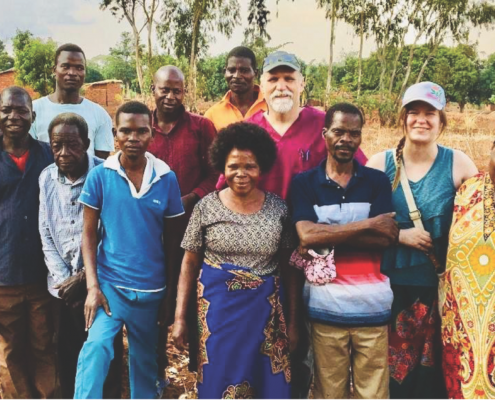
Well, as you said, it’s hot. People are hungry. They need transportation money to care for a relative in the government hospital because that’s not part of the nursing staff’s job. They and their children haven’t eaten for three days because they were very sick and couldn’t work to earn the money to buy food. It’s approaching planting season which happens once the rains come and the government trucks are distributing chemical fertilizer to a few villages in our area to boost the harvest to more than maybe one ear of corn per stalk. The few scattered rain storms have made the mango trees more lush and even the dry dirt has sprouted some green grass. It’s a hopeful time, but for most, a more desperate time. People are hopeful that the next harvest will be better. Desperate, because the last was not and we are truly coming into the hunger season.
Can you give us an overview of how the year went for everyone?
Difficult doesn’t quite cover it. Cyclones came through earlier in the year and downed 5000+ homes, and affected over 25,000 people, just in our district. There were multiple deaths related to the flooding and buildings that collapsed. These events are still coloring the current climate. Homelessness doesn’t quite exist in rural Malawi. If you don’t have your own place, you stay with family members. If you don’t have any living family, you go to your chief and he does his best to designate a place in the village for you. With the upheaval of the previous rainy season, family homes are overcrowded. Those who are more well-off have been able to rebuild or relocate to better prospects. But thousands are still in partially downed houses with no way to afford the rent for a one-room accommodation for their six children household. If I told you all the numbers my wife says, the below poverty level Americans would choke on their espresso.
What have been the highlights and what have been some of the biggest challenges you and the community have faced since we last spoke?
For us, being faced with more financial requests than we can fund. It is extremely difficult to look into the eyes of a sweet 80-90 year old widow who has come to ask for blankets and grass mats so that the four orphans she is now taking care of don’t have to sleep on the dirt and try to cover up with bits of plastic at night and tell her, “palibe,” (we have none).
For the highlights, we were able to arrange a college sponsorship for a one-armed young man named Chisomo. Over 400 people between May and September came to our door asking for assistance ranging from life-saving assistance and food distribution, to greeting us and asking for prayer. We were also able to assist several households with repairs ranging from minor structural repair, roof repair/replacement, and even some complete rebuilds. Through our friend John Mullowney, someone donated money for us to build a house for a blind man, named Patrick, living in Tamanda Village. Also, we were able to purchase a small Lifo motorcycle that gives us some longer-range so long as we stay off the main roads. But generally, a big highlight for us is being greeted daily by people just saying thanks because we came. It’s pretty encouraging.
Dan, I understand you and Alise were recently back in Ashland. How was your trip?
Can you spell FREEZING? There’s always the initial panic of culture shock that we will talk about in a bit. Ashland itself is its own proverbial Vanity Fair. But the kindred spirits of the people we know and love are always a great enjoyment. Also, ice water. And ice cream. Simple comforts that are only occasional treats in the distant city over here are a delicacy. I have to say that we did get a little carried away. We ate ice cream every night. The friends we stayed with, specifically the children, definitely appreciated the desserts they typically wouldn’t buy. We miss them very much. Our friends. Also ice. By the way, hi DuckDuck! Hi Little Cub!
What shocks you the most about coming back into the First World?
Clean streets, running water, the billions of vehicles on the freeways that can’t travel in the carpool lane because there’s only one person inside, even public drinking fountains. We leave the airport and are immediately bombarded by the traffic and the standard of living that is so far above the simple life we know with people who have a patch of dirt to their name that they built their one-room hut out of. It’s opulent. Sheer luxury broadcasts from every new thing that can be bought or get through in-house financing. There’s a tightness in your chest coming from nothing, into this busy and indulgent lifestyle. While we were in Ashland we were hosted by a lovely family comprised of a single mother and her three children. She kept asking me, “Why are you doing the dishes? You don’t have to do the dishes.” I replied, “But you don’t understand, I turn a knob and hot water comes out. I pull the drain plug and it all drains away. How fun is that!” It’s like Tom Hanks in Castaway after returning home staying up all night turning on and off the light switch. It’s not a complaint. I love our life. But it is really cool to turn a knob and have hot water come out. Oh! And don’t forget, opening that big box in the kitchen and having ice and ice cream inside.
Together, you were able to raise money that has gone back with you to Malawi. What will happen next?
We love the support we receive in Ashland. However, this trip the giving was down. We are thankful for what we received and we know our needs will be met. Since we’ve been in Malawi we’ve been renting a place that has met our needs pretty well, but while in Ashland we were informed that we will be losing it shortly due to road construction. Before returning, we were offered a wonderful piece of land for purchase up the hill from our current location. Yet we never dreamed we would be able to obtain it. While we were in Ashland we shared our situation on the internet and were surprised to receive a $1900 donation specifically to purchase the land. So what is next? Immediately upon returning to our village, we purchased the land, and we have developed the plans for the Living Steps Community Resource Center. The center will include our office, our residence, residence space for the Khwale family, in addition, there will be a carpenter shop/vocational training room for Khwale and his brother David to do carpentry work and train young men in their trade. On the other end attached to our residence will be the Ken Casteel Training Room. This room will be a multi-purpose training room used for micro-enterprise training, research and development, this, that, and the other thing. The center will also include a storage room for the day-to-day food provisions that we pass out. Separately, on the property, we hope to build a separate storage building with the capacity to hold shoes received from Soles4Souls, along with other longer-term storage needs. While we are making plans for this and preparing the land, we have no idea where the money is going to come from. But we are sure God will provide.
By the way, did your shipping container with all the well supplies ever arrive?
Ha ha, funny you should ask… Our shipping container with the Soles4Souls shoes, our personal household and shop tools, and well drilling components was just recently loaded and shipped. It will arrive in Dubai by December 31st and should be in Lilongwe, Malawi sometime around the end of January. It has been a long time coming, but it’s on its way. …I pray we have a place to put the shoes.
How in the world will you ever transport that huge container out to your rural location?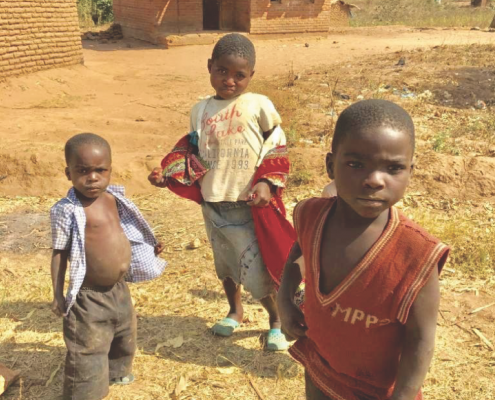
Glad to say that even though it’s dirt, our main road is considered a national highway and we can get it close to our property. Then it will be unloaded and moved by hand or by a smaller lorry truck. Where to? Who knows at this juncture?
I understand that you have had visitors from Ashland spend time with you. Please tell us more.
We have had one new friend named John Mullowney to come visit. However, last October I did travel back with a young lady from Ashland named Alex traveling to Malawi to spend a month with our friend Wendy Elerick who lives close by. Both of them were fantastic guests. John stayed at our house for six weeks and, as anyone who knows him would say, was a complete blessing. He worked hard and asked for nothing. We were as sad to see him leave. Shortly after he arrived he commented to us he didn’t feel he could provide a service a Malawian couldn’t do. But what he didn’t realize is what a great encouragement it was to the local people just that he came. One thing that is very hard for Malawians to understand is why people would come from America the “land of milk and honey” to Malawi to serve and not expect to be served. And it means so much to them that people do. So I assured him the importance of his visit was far more than the physical work he did. It was the encouragement and love he supplied.
Ok, what do you need most right now?
Ice and ice cream, weren’t you listening? Okay, seriously, for us to be able to see our projects come to fruition. The Living Steps Community Resource Center needs to become a reality. I’m sure we can find a place to rent to live if we need to, but to work and serve the local community we need a place to operate out of, and to store supplies.
Specifically, how would you say you, as a person, are changing having spent the last year living in Malawi?
I wouldn’t know how to answer that question. Though it does bring to mind a meeting I had with a new friend in Santa Cruz who comes to the northern region often for his project, H2O Malawi. A local explained to him once that, “Working with you Mzungus is like dancing with elephants.” After hearing this, I completely agree. The Mzungu (white people) that often come here, come with their big money and big projects and big ideas to fix the current system. And more often than not, they leave a BIG problem. They don’t mean to, of course. But in order to try and help remedy the deforestation problem, building with bricks in the major cities is now illegal in Malawi, with the intent of making this the law for the whole country. Malawi doesn’t have the capacity to enforce this law full-time in the rural areas, but this leaves one big hole. What will the poor man make his house out of? Roughly 80% of Malawians cannot afford cement blocks to build the homes they live in. So this law, which has been influenced by big non-profit funding, will in the long run, damage the way of life and still not solve the problem. So, during last December, right after I moved, I stopped all of my projects and decided to just listen to the people. I’ve heard it called a walkabout, so I’ll call it that. I observed life. I went and asked questions. I learned to just listen and get rid of my big ideas to see how I could really just help them. Yes, deforestation is a problem, but so is hunger and homelessness. I cannot look at what I want for the Malawians without seeing first what problems may be caused, as well as what they actually need. We don’t want to change their culture. We want to enrich it.
Wait! It’s illegal to build with bricks in the city? Seriously? Why?
Because when you make handmade bricks after sun drying them you stack them into their own kiln oven shape and then burn wood under for 24 hours to make strong bricks. Thus deforestation. For a villager who has no money, this provides almost free building material for a structure.
So Dan, what are your plans for this year?
Well, with the container on its way, and arriving in January-ish we’ll be able to start the shoe sales micro-enterprise program for real. Soles4Souls was able to get 40 bags of shoes to us a few months ago as a test and it was an overwhelming success. We are very optimistic that this will be a great program and will assist many households and increase their income and viability while supplying many people with good quality useful shoes. We will also be spending time, in earnest, beginning our efforts to kickstart the refuse briquette fuel program. A refuse briquette is a cooking briquette that is made of local biomass refuse. This will allow those that currently illegally make charcoal to have a means of replacing their illegal trade with one that is legal and will more adequately fund their family. The briquettes are also a step towards stopping deforestation. Both of these programs require a place for safe storage, manufacturing, and training. The Living Steps Community Resource Center would be the primary place this would happen. Presses and other needed equipment would be made in the carpentry center, while training for both building and manufacturing of briquette mechanical components would be conducted in the Ken Casteel multipurpose room. Both of these projects rely heavily on us being able to build this center soon.
Ok. Can you talk about the positive impact you have had in your community?
I think I will have to leave this for someone else to answer. What I can say is we appear to be appreciated, people are very kind to us and openly enjoy having us in the community.
I hate to ask this question, but I think it is important. What negative impact have you had, if any?
No problem! What you are asking me I have come to call the unexpected negative outcomes. I first started to notice these from large non-profits, as in the brick comment above, along with smaller groups from the west that come for short-term (1-3 week) trips and leave turmoil in their wake. That is what struck me last December and made me think, “Well, what am I doing?” I have been involved with some local projects that have seemed to be a great idea going in, seemed to be really well thought out, and ended up with unintended fallout that made us question whether they were worthwhile or not. Because of all this, Alise and I are still primarily working to be part of the community serving and helping as needed, and treading softly.
What mental and emotional challenges have you faced living so far away from your native culture and land?
Ice cream deprivation is really traumatizing. To be perfectly honest, other than missing loved ones and friends, there hasn’t been much of a mental-emotional challenge. When I was first here by myself, being alone made me feel I’d go crazy without hearing English spoken. So I ended up talking to myself a lot just to hear it. Now that Alise and I are here together, we are both very content with what we have and can console each other over the loss of refrigeration. Ha ha, we’ll get over it.
How do you continue to innovate and adapt to the experience?
The longer we are here, the more I learn what’s available, and the less I feel I have to count on America for what we need. I’ll be honest, there are some things we can only get from the West, but I’m learning to innovate and make at least what I think I need. And I’m learning I may not need all that I think. I am working on being cautious not to overextend myself and taking the small bites of the elephant so I don’t get a tummy ache. There’s a lot to learn from Malawians. They continue to be ingenious and come up with solutions to mechanical problems those of us from the West would never have dreamed of. Instead, we would have thrown hundreds of dollars at it and had somebody else fix it. Understand I am not saying to not have your shoes repaired by a good cobbler. ;)
What are the best qualities that you see being shared within your community that you would love to bring back to Ashland?
Malawians mostly are happy and pleasant in the midst of their poverty. I can’t say I know that much visible contentment in the masses of middle-class Americans. But if a typical Malawian was to have a structurally sound and dry home, something basic and warm to sleep on, and enough food not to face hunger throughout the year, they would be content. What I think I would most like to bring back is a general sense of contentment with life and a lack of desire for things. The sense I get in Malawi is people are more important than stuff. I may be painting with a broad brush, but I’m honestly not sure if I can say that about America. If Alise and I were stuck in a rainstorm, even though they didn’t know us, they would grab us and bring us in out of the rain. If Alise and I needed shelter I know it would be provided. Ask yourself, can we say the same about America?
Tell us a story that most of us could never imagine happening in Ashland.
This story has multiple parts that would be hard to imagine. First of all, there is a family living miles from food, from water, no power, home falling apart, and yet they are raising a happy young girl. Since they have no appliances or modern conveniences they must cook by the flame of an open cook fire. Now imagine your twelve-year-old daughter fainting and falling face-first into that fire. Now imagine there is no 911, there is no ambulance, there is nothing and no one who can come and assist you and your child. Now imagine it’s been two years, your daughter has lost part of her mouth, one eye, one ear, and her nose and during this period, and she has had no treatment. Some wounds have not fully healed, some things have scarred over, and there is still no one who is going to help you. Now imagine two Mzungus from America stumble across you, and with the help of others bring you household items, food, and build you a small new home. But after seven months of assisting you, though they have tried, they have yet to find someone to medically help your now fourteen-year-old daughter. Welcome to the Third World.
I know you have received support from so many people here in Ashland. Would you mind mentioning a few special individuals?
Sure! Let’s start with some businesses. Thanks to Ashland General Hardware for always allowing us to share our needs at their front door on an ongoing basis, which has helped to raise a large percentage of our donations. They are very supportive and are wonderful people. Thanks to Bloomsbury Blends coffee shop for hosting our fundraisers and our upcoming art show in March. And of course thanks to Kela and Adam at Dan’s Shoe Repair for hosting our African displays. Also, the businesses that have donated gift items for fundraising baskets. Northwest Raw, Music Coop, Platt Anderson Cellars, Smithfields, Pie and Vine, Ruby’s, Paddington Station, Village Baker, and any we have failed to mention. And to our local major donors: Ken C., Barbara D., Dan T., Stan P., Miriam C., Danielle P., Ben & Patricia F., Cari B., Joann H., His Valley, Charlene R., Vadim A., and to everyone who has tossed in ten or twenty dollars at our table or at Dan’s Shoe Repair -we wouldn’t be doing all that we’re doing without you. And lest we forget, thank you LocalsGuide. Shields, you’ve been great.
Aw, thanks, Dan.
Anytime.
Do you have any last thoughts to share with our readers?
I hope that nothing we have said makes it sound as if we are disrespecting America or Ashland. We know that Ashland is filled with good people and we now fondly consider it our home-away-from-home. You asked us some pointed questions and we gave straight answers. If nothing else, we hope that people take time to think about what we’ve said and what it might mean in their lives.

